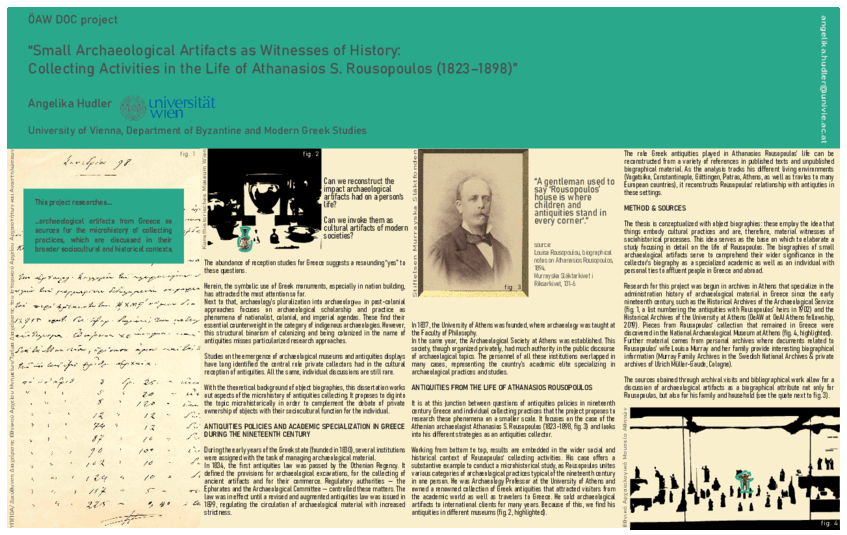Small Archaeological Artifacts as Witnesses of History: Collecting Activities in the Life of Athanasios S. Rousopoulos (1823–1898)

Small Archaeological Artifacts as Witnesses of History: Collecting Activities in the Life of Athanasios S. Rousopoulos (1823–1898)
Project title: “Small Archaeological Artifacts as Witnesses of History: Collecting Activities in the Life of Athanasios S. Rousopoulos (1823–1898)”
Funding: DOC Fellowship Programme of the Austrian Academy of Sciences
Doctoral project: Angelika Hudler, BA MA – DOC fellow at the Department of Byzantine and Modern Greek Studies of the University of Vienna
Funding period: 2020–2023
Project director: Univ. Prof. Dr. Maria A. Stassinopoulou
Project description:
Regarding the prominence of archaeology and antiquities in Greek history, research so far tended to focus on the political use of the past in nation building and international diplomacy, the organization of large excavations, the history of institutions, and seminal events in the progress of scholarship. Complementing these grand narratives, “Small Archaeological Artifacts as Witnesses of History: Collecting Activities in the Life of Athanasios S. Rousopoulos (1823–1898)” saw the cultural history of Greek antiquities with biographical eyes. It combined historical biography and object biography by immersing into the life and collecting of Athanasios Rousopoulos, one of the early archaeology professors at the University of Athens (1868–1884) and a prominent Athenian collector and art dealer. His controversial legacy — acclaimed academic, criticized antiquities looter — was studied by comparing the chronology of his collecting activities and scholarship during the formation period of institutionalized archaeology in the mid to late nineteenth century and museum building in and outside of Greece. Rousopoulos was a central protagonist in these processes, and his activities were supported by his family network.
Given the antiquities’ central place in his social roles as an intellectual professional and informed collector, and, vice versa, Rousopoulos’ central position in defining the objects’ epistemic, patrimonial, and commercial capacities typical of the era, retracing the artifacts’ historical polyvalence and how they pertained to Rousopoulos’ life periods was the project’s central concern. It asked when, where, why, and with whom this interesting historical character was involved with archaeological material. His short as well as long-term networks in the cities where he lived and worked (Vogatsiko, Constantinople, Athens, the German states, Patras, as well as many more cities in Europe where he travelled on business or private occasions) would determine his later local and international commemoration. These networks were retraced with special attention to his collecting and art commerce.
Sources — physical artifacts and written texts — were obtained by new research in administrative, scholarly, and personal archives, as well as the inventories of antiquities museums (Athens, Budapest, Vienna, Graz, Heidelberg, Berlin, Boston). The material provides insight into the antiquities’ biographical organization by their scholar and owner Rousopoulos and his changing social networks over the course of his life. The project outcome will be the dissertation “Biographies of archaeological artifacts: the professor and collector Athanasios Rousopoulos (1823–1898)” (Angelika Hudler, BA MA).
